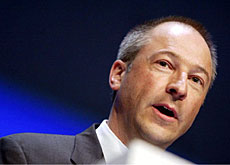Government outlines Swisscom privatisation

The government has fixed guidelines on its privatisation of Swisscom, Switzerland's leading telecoms provider.
Analysts said the strategy contained nothing new, while the Communication Union announced it would consider launching a referendum against it.
The cabinet pledged on Wednesday to examine all possibilities to ensure Swisscom does not fall into foreign hands once privatised.
It said Swisscom may make foreign acquisitions as long as the target is not a provider of basic telephone services in a particular country, lifting an earlier total ban.
“We want Swisscom to remain an independent company,” said Finance Minister Hans-Rudolf Merz. “We are examining all possibilities from a blocking minority to a minority share and controlling rights.”
Swisscom said the government’s new strategic goals granted the former state monopoly “limited flexibility” for acquisitions.
“Swisscom has acknowledged this [lifting of the ban] and will determine its future corporate strategy accordingly in the months to come,” the company said in a statement.
Guidelines
The guidelines for 2006-2009 come a month after the government blocked Swisscom from making any acquisitions outside its home market.
This effectively prevented a planned takeover of Irish telecoms company Eircom.
The ban also scuppered a potential deal to take over Denmark’s top telecoms firm TDC, which then went to a group of private equity firms for $12 billion (SFr15.68 billion) at the end of November.
The finance ministry said on Tuesday the government had reduced its majority stake in Swisscom to 62.45 per cent.
In a statement, the ministry explained that the government intended to cut its stake even further in the medium term to 50 per cent plus one share.
Merz has said the government’s ultimate goal is to privatise the company completely because it is no longer willing to carry the political and economic risks.
Political differences
The centre-left Social Democrats, the centre-right Christian Democrats and the unions have opposed such a move.
They argue that if the government steps aside, Swisscom itself might become a takeover target, fall into foreign hands and put its public service mandate within Switzerland into question.
The Social Democrats have threatened to force a referendum on the issue if the government persists in its plans to privatise Swisscom.
But the centre-right Radical Party and the rightwing People’s Party have argued in favour of the state off-loading its shares.
On Tuesday the company announced it had successfully concluded a SFr2-billion share buy-back programme launched in line with its dividend policy announced in May.
Swisscom explained that during the current year, it had distributed a total of SFr2.9 billion to shareholders in the form of a dividend (SFr861 million) and the share buy-back.
The price of company shares has fallen by more than eight per cent this year.
swissinfo with agencies
The Swiss government’s stake in Swisscom has been reduced to 62.45% from 66.1% after it participated in the Swisscom share buyback programme.
There are 64,000 other shareholders. Twelve of these have more than 100,000 shares each.
In comparison, the neighbouring German government holds 37% of Deutsche Telekom.
The French government has 33% of France Telecom.
On November 23 the government announced it wanted to sell its 66.1% share in Swisscom.
The following day it became known that the government had forbidden Swisscom to make any acquisitions abroad.
A deal to purchase the Irish operator Eircom was therefore shelved at the last minute and SFr1.5 billion was wiped off the value of Swisscom shares.
On December 2 the government clarified its ban on foreign acquisitions, saying it only related to fixed-line operators.

In compliance with the JTI standards
More: SWI swissinfo.ch certified by the Journalism Trust Initiative











You can find an overview of ongoing debates with our journalists here . Please join us!
If you want to start a conversation about a topic raised in this article or want to report factual errors, email us at english@swissinfo.ch.